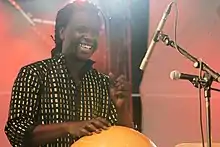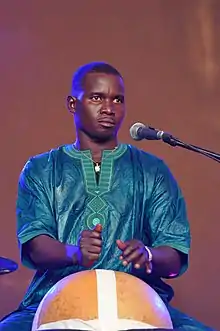Calabash (percussion)
In African music, the calabash is a percussion instrument of the family of idiophones consisting of a half of a large calabash, which is struck with the palms, fingers, wrist or objects to produce a variety of percussive sounds.[1]
| Percussion instrument | |
|---|---|
| Classification | percussion |
| Hornbostel–Sachs classification | 111.3 |
In Tuareg music, the askalabo[2] is a calabash "partly submerged in water, drummed to mimic camels' hooves".[3]
The calabash can also be used as a sound board: a finger piano (a flat board with a bridge on which prongs are fastened, that are then played with the fingers) can use a calabash for that purpose,[1] and the gongoma is a similar instrument, using saw blades on a bridge affixed over the calabash—the blades are plucked with the fingers, while the player taps the calabash with their other hand.[4]

Percussionist playing the Calabash with the bare hand technique

Percussionists playing Calabash with both fists and fingers
References
- Nzewi, Odyke; Nzewi, Meki (2007). A Contemporary Study of Musical Arts: Theory and practice of modern African classical drum music. A Contemporary Study of Musical Arts: Informed by African Indigenous Knowledge Systems. 5. African Minds. pp. 1, 4. ISBN 9781920051686.
- Peek, Philip M.; Yankah, Kwesi, eds. (2004). African Folklore: An Encyclopedia. Routledge. ISBN 9781135948726.
- Davies, Sam (1 August 2019). "'My father said I should be looking after the cows': the first female Tuareg guitarist". The Guardian. Retrieved 6 August 2019.
- Kalani; Camara, Ryan M. World Rhythms! Arts Program presents West African Drum & Dance: A Yankadi-Macrou Celebration. Alfred Music. p. 38. ISBN 9781457422331.
This article is issued from Wikipedia. The text is licensed under Creative Commons - Attribution - Sharealike. Additional terms may apply for the media files.